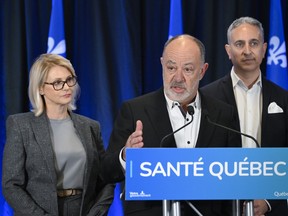“Anyone who is in favour of equitable access to medical care is not happy with this news,” a Canadian Health Coalition spokesperson says of the number of doctors going private.

A total of 780 general practitioners and specialists are “non-participants” in the public system and no longer bill the Régie de l’assurance maladie du Québec for their services, up by nearly 22 per cent from 641 the year before, according to a list compiled by RAMQ as of July 12. That represents the biggest single-year increase on record.
“For us, the situation is at a point of no return,” said Dr. Isabelle Leblanc, of the group Médecins québécois pour le régime public. “We have been worried for a long time with the number of MDs opting out of RAMQ, and now we know that our worries were justified.
“We are appalled but not surprised by these numbers — which likely underestimate the number of physicians working in the private system, because some specialists opt in and out every few weeks — and we think something should be done as soon as possible to put a stop to it,” she added.
Anne Lagacé Dowson, a spokesperson for the Canadian Health Coalition, echoed Leblanc’s concerns, warning that doctors who go private end up hurting the public system.
“Anyone who is in favour of equitable access to medical care is not happy with this news,” she said. “Quebec was (one of) the last province(s) to join medicare (in 1970) and seems to be the worst offender of all the provinces with regard to opting out for completely privatized physician care. This siphons off doctors from the public system, is very bad for the public system and bad for Quebecers who need primary medical care.”
Indeed, for every one medical specialist who has opted out of Quebec medicare, more than two primary-care physicians have gone private, according to a Gazette analysis of the RAMQ figures. Although the number of non-participant physicians represents about four per cent of all doctors in Quebec, that percentage has been growing. Just seven years ago, only two per cent of all Quebec doctors had gone private.
The decision to go private comes amid mounting frustration by doctors with what they view as costly medical red tape in the public system and its lack of resources. It’s also a reflection of the deteriorating state of Quebec’s $60-billion-a-year health network, which is beset with growing wait lists for surgery and chronic emergency room overcrowding. Some orthopedic surgeons, for example, have gone private because they say they’re not given enough operating-room time in hospitals.
However, the exodus of physicians toward the private sector has also contributed to lengthening wait lists in the public network, creating a de facto two-tier system in Quebec — with those who have the means to pay out of pocket for certain procedures in the thousands of dollars suddenly able to jump the public queue for quicker access to private care.
Leblanc blamed the Coalition Avenir Québec government for accelerating two-tier medicine.
“Private clinics come to recruit (medical) residents before they even finish (their training) and promise excellent working conditions — weekdays only, no evenings or weekends, no calls (at home),” she explained. This has left a shrinking number of public-sector physicians “with all the difficult hours … to cover these shifts.”
Patient-rights advocate Paul G. Brunet suggested that Santé Québec has its work cut out for itself in seeking to retain physicians in the public system.
“The public regime is becoming less and less popular with professionals,” Brunet said. “It will take time and a lot of motivation from the new Santé Québec (agency) for health professionals to regain a taste for the public regime.”
Many members of the general public might have in mind cosmetic surgeons when they think of fully private physicians. However, the largest number of specialists who have opted out of medicare in Quebec are dermatologists, with a total of 41, according to The Gazette’s analysis. Next on the list are orthopedic surgeons, 38 of whom have gone private, inadvertently swelling the wait lists for consultations in the public sector.
In fact, more than 50,000 Quebecers are waiting for a consultation with an orthopedic surgeon. Nearly 33,000 of them have already waited — often in pain — beyond the medically acceptable delay, in some cases for over a year. And a record 97,376 Quebecers are waiting in the public system for their first appointment with a dermatologist; nearly 60,000 of them have waited past the acceptable delay.